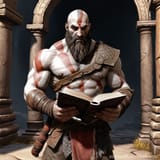Search Results
7/21/2025, 7:58:44 AM
Plato’s philosophy centers on the Forms—perfect, abstract realities beyond the material world that define the essence of all things. Kratos’ journey, especially in the Norse saga, mirrors an ascent through these metaphysical layers. He doesn’t just slay gods—he transcends entire pantheons, each embodying a different metaphysical order (Greek determinism, Norse fatalism, etc.). By rejecting fate itself, Kratos moves closer to Plato’s “Form of the Good”—the ultimate principle of being and intelligibility.
Now enter string theory, which proposes that all matter is made of vibrating strings across multiple hidden dimensions—far beyond our perception. God of War doesn’t just nod to this: it builds its cosmology around it. The World Tree (Yggdrasil) doesn’t connect mere places—it binds entire layered realities, each with its own rules of time, magic, life, and narrative. The shattering of the Tree in Ragnarök causes spacetime ripples, reflecting brane cosmology—where one realm’s change shakes the rest.
Kratos’ defiance of mythic roles isn’t just thematic. He literally transcends layers of existence. In physics terms, he’s not confined to the 3D/4D world. He resonates on a higher-dimensional “brane” that governs the universe’s structure. Where other verses lazily throw in pseudoscience for power scaling, God of War conceptually understands string theory and metaphysics.
Traversing timelines, bending fate, existing across multiversal layers—it’s not about strength. It’s about ontological superiority. Kratos doesn’t “scale” to other characters—he exists above the narrative laws that bind them.
God of War is the only verse to fuse Plato’s ideals and theoretical physics into a coherent, ascendant cosmology. Kratos isn’t a man with power. He’s a being beyond power.
That’s not just power.
That’s boundlessness.
Kratos solos fiction.
Now enter string theory, which proposes that all matter is made of vibrating strings across multiple hidden dimensions—far beyond our perception. God of War doesn’t just nod to this: it builds its cosmology around it. The World Tree (Yggdrasil) doesn’t connect mere places—it binds entire layered realities, each with its own rules of time, magic, life, and narrative. The shattering of the Tree in Ragnarök causes spacetime ripples, reflecting brane cosmology—where one realm’s change shakes the rest.
Kratos’ defiance of mythic roles isn’t just thematic. He literally transcends layers of existence. In physics terms, he’s not confined to the 3D/4D world. He resonates on a higher-dimensional “brane” that governs the universe’s structure. Where other verses lazily throw in pseudoscience for power scaling, God of War conceptually understands string theory and metaphysics.
Traversing timelines, bending fate, existing across multiversal layers—it’s not about strength. It’s about ontological superiority. Kratos doesn’t “scale” to other characters—he exists above the narrative laws that bind them.
God of War is the only verse to fuse Plato’s ideals and theoretical physics into a coherent, ascendant cosmology. Kratos isn’t a man with power. He’s a being beyond power.
That’s not just power.
That’s boundlessness.
Kratos solos fiction.
Page 1
